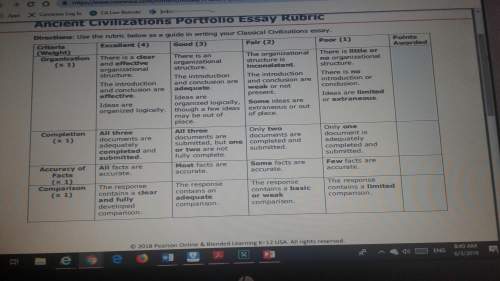
History, 23.10.2020 06:01 AngstyGroot
Select the correct answer from each drop-down menu.
In the Miranda v. Arizona case, the police had not informed the accused, Ernesto Miranda, about his
A. first
B. fifth
C. Ninth
Amendment right against self-incrimination, or about his
A. third
B. fourth
C. sixth
Amendment right to a legal defense.

Answers: 3


Another question on History

History, 21.06.2019 16:30
Which option most accurately explains roosevelt’s motivation in forming the bull moose party? a. he thought that president taft had failed to continue his policies of progressive reform. b.he thought president taft’s conservation legislation was effective but poorly timed. c.he wanted to change president taft’s foreign policy toward asia. d. he saw that president taft focused on antitrust legislation to the exclusion of other reforms.
Answers: 1

History, 21.06.2019 22:20
This is a picture of workers in a factory. why was this picture most likely taken? to advertise that kids could get jobs to expose the horrors of child labor to show pride in children at work to show that night workers were needed o
Answers: 1


History, 22.06.2019 02:30
Did the spanish settlers and missions have a positive effect on world history? why, what did they do that was positive? why was the treaty of paris (1763) good for the world/world history? did the plymouth colony have a positive effect on world history? why, what did they do that was positive?
Answers: 3
You know the right answer?
Select the correct answer from each drop-down menu.
In the Miranda v. Arizona case, the police had...
Questions

Chemistry, 09.04.2021 02:40

History, 09.04.2021 02:40


History, 09.04.2021 02:40

English, 09.04.2021 02:40

Mathematics, 09.04.2021 02:40



Computers and Technology, 09.04.2021 02:40

Mathematics, 09.04.2021 02:40






Mathematics, 09.04.2021 02:40

Mathematics, 09.04.2021 02:40

Biology, 09.04.2021 02:40


Mathematics, 09.04.2021 02:40




